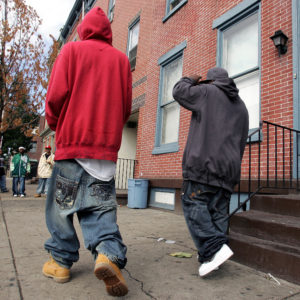In states like South Carolina and Montana, elected officials are moonlighting as the fashion police. As if the social pressures to look presentable are not enough of a hassle, some government officials keep working to add restrictions to the way we dress, in the form of fines and even jail time.
While statewide restrictions have been rejected, some towns have already passed variations of these regulations. One such law calls for as much as a $600 fine after two warnings for individuals who wear “pants, trousers or shorts such that the known undergarments are intentional (sic) displayed/exposed to the public.”
Before its repeal, Ocala, Florida, residents could face as much as 6 months in jail for the same “offense.”
Obviously, such laws and their punishments are highly questionable. For starters, the ability to see undergarments is hardly a sign of indecency. In fact, it merely suggests that the underwear in question is functioning precisely as designed.
Kidding aside, the most commonly cited justifications for these attempts to police fashion choices are public decency or violations of expected clothing standards.
However, such laws merely represent an astounding level of government paternalism through regulation of “acceptable” dress.
Whether we look to Rep. Joe Jefferson’s, statement that he’s “looking out for the benefit of men,” or Councilman LeRoy Blackshear’s comment that “(sagging) had become a nuisance to me and most of the citizens of the county,” the message is clear: law-abiding citizens will be penalized if they fail to conform to these men’s arbitrary standards.
However, irrespective of their level of public support, in the United States of America personal preferences are just that: personal. And thus, they are not the business of the state. No one has the right to dictate what others must wear or to force another individual to change. Like it or not, the tradeoff for living in a free society is that others are free to do things we may not like or approve.
While many have rightfully attacked such laws on these grounds, few have touched upon the far more insidious implications that lie at their heart. While on the surface these dressing laws may seem harmless enough, they work to increase police intervention into otherwise law-abiding society, forcing law enforcement to “police” that over which they arguably have no legal right.
Secondly, since many of the “offensive” styles of dress are those that have been traditionally associated with the black community, these laws act as vehicles merely to lock up more black men — for doing nothing. And, in an age where individual liberties and freedoms are increasingly being attacked and jails are already packed full of non-violent offenders, any call for more unnecessary regulation only exacerbates such problems.
Beyond being entirely unnecessary, these proposals highlight a long-standing tradition within American politics; an over-reliance on laws and, by extension, the police to resolve perceived social “nuisances.” More than just addressing minor inconveniences, these slight modifications in policing powers compound into an ever-expanding list of police responsibilities and new methods of social control.
Instead of explicitly stating their opinions and the purpose of the policies, politicians rely on emotionally driven, vaguely defined rhetorical devices like public decency standards to codify personal attitudes in law. This allows officials to further entrench narratives of police necessity and to perpetuate the normalization of law enforcement involvement in minor aspects of daily life.
It is this expansion of “micro-policing” that has allowed our criminal justice infrastructure to expand into a system that far outpaces those of other countries. Accordingly, the Terrebonne, Louisiana, NAACP (one of the jurisdictions that banned sagging pants) was completely correct in stating that “this is not a black issue, this is not a white issue, this is a people issue.” And not because it will impact every group equally but because of the larger trend toward codifying civil rights violations that bans like these represent.
Are sagging pants aesthetically pleasing? Perhaps not. Should people who fail to meet the particular fashion standards of others be fined or jailed? Absolutely not. With over 10.6 million jail admissions in 2016 alone, the last thing we need to do is expand the population of incarcerated individuals in the United States.
It is no exaggeration to say that even seemingly small debates over clothing thread into discussions of the fabric of our society. Our laws should seek to protect our founding principles, not to solidify some people’s preferences to the detriment of others and, most often, to the most vulnerable segments of our population.
Put simply, government power should not be used to regulate fashion, and certainly not by the generation that donned fanny packs and leisure suits. As a society, we must be more cautious and deliberate whenever we employ police and, by extension, state power. Laws regulating individual choice — even sagging pants — should be left where they belong, behind us.

